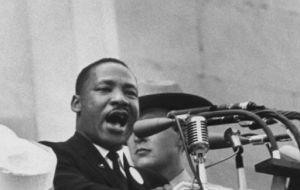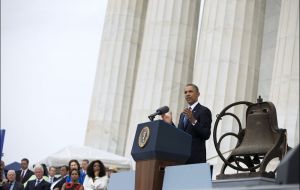MercoPress. South Atlantic News Agency
Obama honours 50 anniversary of March on Washington and the ‘I have a dream’ speech
 King’s speech helped integration and change the history of the US in peace
King’s speech helped integration and change the history of the US in peace Addressing hundreds of thousands of people commemorating on Wednesday the 50th anniversary of the March on Washington for civil rights, US President Barack Obama underlined the “unfinished business” in the struggle for equality and justice in America
Fifty years after Rev. Martin Luther King, Jr., delivered his “I Have a Dream” speech at a time of severe racial injustice and inequality in the United States, the country’s first black president stood in the same place on the steps of the Lincoln Memorial.
In 1963, King's address energized the civil rights movement and paved the way for major legislation, including the Civil Rights Act of 1964, which outlawed major forms of discrimination against minorities and women.
Obama paid tribute to the late civil rights leader and the sacrifices of those who marched in Washington to bring transformation to America.
“Because they marched, a civil rights law was passed. Because they marched, a voting rights law was signed. Because they marched, doors of opportunity and education swung open so their daughters and sons could finally imagine a life for themselves beyond washing somebody else's laundry or shining somebody else's shoes. Because they marched, city councils changed, and state legislatures changed and Congress changed, and, yes, eventually the White House changed,” said Obama.
The U.S. president continued that those who marched in 1963 brought change not just for African Americans, but other racial and ethnic groups, women and gay Americans, and for those yearning for freedom around the world.
“America changed for you and for me, and the entire world drew strength from that example, whether it be the young people who watched from the other side of an Iron Curtain and would eventually tear down that wall, or be it the young people inside South Africa who would eventually end the scourge of apartheid.”
Obama's address marked one of only a few occasions since he was first elected to the White House in 2008 that he has spoken on a US stage about issues of race.
It also came amid new concerns about setbacks to civil rights from, among other things, the recent Supreme Court decision striking down a key part of the 1965 Voting Rights Act.
Obama said those who suggest little has changed in America dishonor the sacrifice of those who marched in 1963.
At the same time, he said the work is not complete. He noted challenges to voting rights, high unemployment rates for African-Americans and Latinos, and other problems he said require vigilance.
“To secure the gains that this country has made requires constant vigilance, not complacency, whether by challenging those who erect new barriers to the vote, or ensuring that the scales of justice work equally for all, and the criminal justice system is not simply a pipeline from under-funded schools to overcrowded jails. It requires vigilance.”
Obama referred to a growing wealth gap among races, and the eroding position of working Americans, something he said makes the dream that King described “more elusive.”
The US president also decried what he called “the politics of division” in Washington. “We now have a choice. We can continue down our current path in which the gears of this great democracy grind to a halt and our children accept a life of lower expectations, where politics is a zero-sum game, where a few do very well while struggling families of every race fight over a shrinking economic pie. That's one path. Or we can have the courage to change,” said Obama.
A long list of speakers including present-day civil rights leaders, a son and daughter of King, and television and movie stars, also addressed the crowd on the National Mall.
Former president Bill Clinton spoke about the sour national political atmosphere.“We don't face beatings, lynchings and shootings for our political beliefs anymore, and I would respectively suggest that Martin Luther King did not live and die to hear his heirs whine about political gridlock. It is time to stop complaining and put our shoulders against the stubborn gates holding the American people back,” said Clinton.
Former president Jimmy Carter criticized the Supreme Court decision striking down the key provision of the Voting Rights Act.
”I believe we all know how Dr. King would have reacted to the new ID requirements to exclude certain voters, especially African Americans. I think we all know how Dr. King would have reacted to the Supreme Court striking down a crucial part of the Voters Rights Act just recently passed overwhelmingly by Congress,” said Carter.





Top Comments
Disclaimer & comment rules-

-

-

Read all commentsThe Telegraph has Obama as saying he “was standing on the shoulders of King”.
Aug 29th, 2013 - 03:31 pm 0More like cashing in on a unique American citizen whose like will never be replicated by someone such as Obama.
From an historic point of view I always wonder what if?
Aug 29th, 2013 - 04:28 pm 0What if King, Lincon, Ghandi, Kennedy, Saddat had lived.
What would our societies be like today?
http://en.mercopress.com/2013/08/29/obama-honours-50-anniversary-of-march-on-washington-and-the-i-have-a-dream-speech#comment272153: I take that you did not see the interview that Obama gave PBS.
Aug 29th, 2013 - 11:58 pm 0Commenting for this story is now closed.
If you have a Facebook account, become a fan and comment on our Facebook Page!